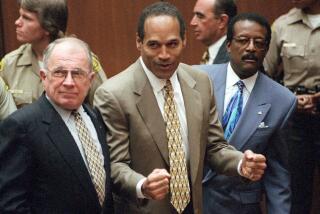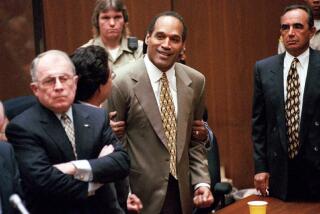Discord surrounds James Brown’s estate
- Share via
COLUMBIA, S.C. -- The self-proclaimed widow admits she’s been a bit of a drama queen, and she’s not about to apologize for it. The lawyer feels brushed aside after more than two decades of dedication. The preacher had trouble dealing with the death of a man who took the role of the father who abandoned him.
And the son is at peace, ready to continue his father’s work.
A year after music legend James Brown died in an Atlanta hospital, the people who surrounded him in life continue to fight over the future of his fortune and legacy. People claiming to be Brown’s relatives have entered the fray. And none of what’s become a tragicomic saga looks to be resolved anytime soon.
Brown, who died Dec. 25, 2006, at age 73, continues to be remembered for a larger-than-life personality, his voice and flashy footwork inspiring generations of entertainers. The Godfather of Soul won Grammys, recorded more than 110 charted singles and is credited by some with inventing funk and rap music.
As thousands attended public memorial services for Brown, the legal rifts surrounding his estate were forming. It took two months for him to be buried, his body at one point resting in a sealed gold coffin inside his home. After he was buried in March on one of his daughter’s properties, his family said a more public mausoleum was planned. There’s still talk of a Graceland-like museum at his Beech Island, S.C., home.
Tomi Rae Hynie, a former backup singer who claims to be Brown’s fourth wife and the mother of his child, said she led the private funeral procession that day with her son. She’s claimed Brown wanted her to have his home in the western part of South Carolina, but she was locked out.
“Everybody says I’m being a drama queen and I’m a great actress,” Hynie said, alternately sobbing and joking during a recent telephone interview. “All I did was cry and fall to my knees and faint a couple of times. Isn’t that how a wife is supposed to act at a funeral when she loses the man she loves?”
She’s since been a fixture in courtrooms as she vies for half of Brown’s estate. Just how much that is worth remains unclear. In October, Forbes reported Brown made an estimated $5 million in the prior year alone. But attorneys have said Brown’s accounts do not have the money they expected.
Buddy Dallas has spent the year immersed in the fight over Brown’s estate.
Brown’s longtime attorney and advisor met the entertainer in 1984 and was “with him through thick and thin from then until now.”
“Mr. Brown needed what I was able to give him, and that was someone he could trust,” Dallas said. “And I was there for Mr. Brown’s children as well.
“My only regret is that the children cannot accept the will of their father,” Dallas said. “He left household and personal effects to his children. He left a trust fund to educate his grandchildren. And then everything else on the face of the Earth that he owned he left to the needy and underprivileged children of Georgia and South Carolina for educational purposes.”
As for Hynie, Dallas says she’s not Brown’s widow because she was still married to another man when she and Brown said their vows in 2001.
For Daryl Brown, one of six adult children listed in his father’s will, the estate and the money it holds is less important than his father’s musical legacy. Daryl Brown said keeping his father’s band together is his priority.
“We have some family members that really just eat and sleep the situation,” he said. “I was more prepared. I already knew what my assignment was.”
Accepting Brown’s death was more difficult for the Rev. Al Sharpton, who first met Brown as a boy. The two become closer in 1973 after Brown’s son died.
“He lost Teddy, his oldest child, and my father kind of abandoned me. So in many ways I became the son he lost, and he became the father I never had,” Sharpton said.
Sharpton said he rode with Brown’s body from Augusta, Ga., to Harlem, N.Y., where a second public ceremony took place.
“I just felt like I couldn’t leave him,” Sharpton said. “This was like my father. And that’s why to me I just can’t sit in court and watch the bickering, because it’s too personal.
“The irony is that people are squabbling over things that James Brown created and earned. He didn’t inherit anything. He grew up fatherless, motherless, penniless, and left people arguing over what they inherit from him.”
More to Read
The biggest entertainment stories
Get our big stories about Hollywood, film, television, music, arts, culture and more right in your inbox as soon as they publish.
You may occasionally receive promotional content from the Los Angeles Times.










